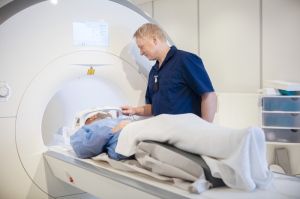por
Thomas Dworetzky, Contributing Reporter | February 24, 2017
With precautions, it can be safe to do an MR scan on a patient with a standard or non-MR-conditional pacemaker or defibrillator, a new multicenter study has found.
The team, led by scientists at The Scripps Research Institute (TSRI), showed that, "device or lead failure did not occur in any patient with a non–MR conditional pacemaker or implantable cardioverter defibrillator (ICD) who underwent clinically indicated non-thoracic MR at 1.5 Tesla, was appropriately screened, and had the device reprogrammed in accordance with the prespecified protocol," Scripps researcher Dr. Robert J. Russo and colleagues reported in the Feb. 23 issue of the
New England Journal of Medicine.
Researchers at 19 U.S. institutions tested 1,000 cases with the non-MR-conditional pacemakers and 500 with non-MR-conditional ICDs to create the registry. Scans were to areas other than the chest, including brain, spine and extremities.



Ad Statistics
Times Displayed: 75267
Times Visited: 5317 MIT labs, experts in Multi-Vendor component level repair of: MRI Coils, RF amplifiers, Gradient Amplifiers Contrast Media Injectors. System repairs, sub-assembly repairs, component level repairs, refurbish/calibrate. info@mitlabsusa.com/+1 (305) 470-8013
They established and followed a specific protocol for device interrogation, programming, patient monitoring and follow-up designed to cut down the risk of scanning.
"If the patient was not dependent upon their pacemaker, the device was turned off," stated Russo. "If they could not tolerate having the device turned off, it was set to a pacing mode that did not sense cardiac activity. The reason was that the pacemaker could sense the electrical activity (radio frequency energy) from the MR scanner, and the function of the device could be inhibited, which could be catastrophic if you depend upon your pacemaker for your heartbeat."
The results show that this protocol means that, “we can do this safely using a careful procedure and careful practice in an experienced center,” Dr. Robert Biederman, director of cardiovascular MR at Allegheny General Hospital and a study co-author,
told Triblive.
The FDA has not approved MR for patients with cardiac implants that don't meet the MR-conditional criteria – about 2 million Americans and an estimated 6 million others around the globe.
The importance of the protocol and need for careful monitoring was underscored by the the adverse effects – although they were few.
Six patients had “a brief period of atrial fibrillation, and in six additional cases pacemaker partial reset was noted.”
"One ICD generator could not be interrogated after MR and required immediate replacement; the device had not been appropriately programmed per protocol before the MR," Russo advised.
Given the few negative results, the researchers think that as long a suitable protocols are followed, "device removal and replacement seem unlikely to be safer than proceeding with scanning for patients with a pacemaker or an ICD who require a non-thoracic MR.”
The findings were called “very significant in terms of clinical practice, because for years and years and years it's always been [the case] that scanning pacemaker patients with MR was contraindicated" if they had older devices, Mayo Clinic's Dr. Robert Watson, who was not part of the study,
told Reuters Health.
But he also stressed that the study's findings not be misunderstood. “You can still kill a patient with an MR, if you do it wrong," said Watson.

